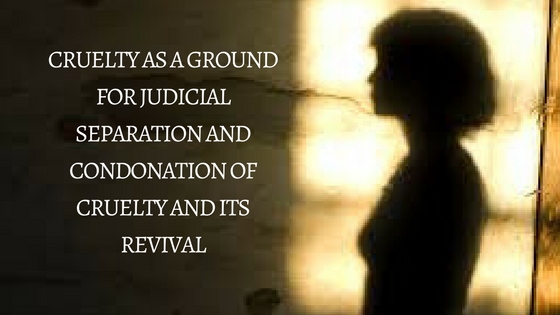Aapka Consultant Judgment Series- In this series, we are providing case analysis of Landmark Judgments of Hon’ble Supreme Court of India.
Dr. N.G. Dastane Vs. Mrs. Sucheta Dastane
AIR1975SC1534, (1975)2SCC326
Hon’ble Judges/Coram: N.L. Untwalia, P.K. Goswami and Y.V. Chandrachud, JJ.
Decided On: 19th March, 1975
FACTS:-
The appellant, Dr. N.G. Dastane got married to the respondent, Mrs. Sucheta Dastane. They had three daughters born out of their lawful wedlock. Marriage was arranged between the appellant and the respondent on 13th May, 1956. The relationship between the appellant and the respondent soured due to whimsical behaviour on part of the respondent. The parties were last together on 27th February, 1961. The appellant first approached the trial court on 19th February 1962, seeking nullity under Section 12(1)(c) of the Hindu Marriage Act, 1955 (hereinafter “HM Act”), or divorce under section 13(1)(ii), or Judicial Separation under Section 10(1)(b). The trial court turned down the first two contentions but granted judicial separation on grounds of “cruelty”. However, the District Court dismissed the appellant’s appeal and allowed the respondent’s. The Bombay High Court dismissed the appeal of the appellant as well on 24th February 1969. However, it allowed a special leave to appeal to the Supreme Court under Article 136 of the Indian Constitution. It is on this appeal that this matter was decided.
ISSUE:-
- Whether whimsical/capricious behaviour amounts to cruelty under Section 10(1)(b) of the HM Act?
- Whether an act once condoned can be revived if provoked by the spouse who condoned the act?
JUDGMENT:-
The Bombay High Court had reappreciated the evidence as it believed that both the lower corrects had failed to apply the correct principles of law with regard to cruelty. The Supreme Court observed that this process had its own share of problems, as there was no evidence on record about the behaviour of the husband to which the wife had allegedly responded to, and thus there can be no inference drawn as against the wife. Since there was no evidence of any actions on the part of the husband which provoked such acts on the part of the wife, the High Court could not have concluded about the same.
First the Supreme Court dealt with the Standard of Proof. The High Court had held that the burden of proof that ought to be used in the matter is that of the evidence being ‘beyond reasonable doubt’. The Supreme Court held that the view of the High Court was erroneous and that marital disputes, being in the nature of civil disputes, incur the standard of proof of ‘preponderance of probabilities’. Neither section 10 nor section 23 of the HM Act calls for the application of the ‘beyond reasonable doubt’ standard of proof because disputes arising out of marriage are in the nature of civil, rather than criminal disputes.
Then, the Supreme Court went on to analyse the meaning of ‘cruelty’ under Section 10(1)(b) of the HM Act. The Supreme Court held that cruelty consists of situations and circumstances which either cause danger or cause a reasonable apprehension of the same. The Supreme Court also observed that the High Court was wrong in applying the ‘reasonable man’ standard as to what a prudent man might consider to be a danger to one and what he might not. The Supreme Court held that the test is not whether the conduct would be cruel to a reasonable person, but whether it would be cruel to the aggrieved spouse.
Following this was a detailed discussion of the respondent and her fitful tantrums that she kept throwing at regular intervals. This led to the court remarking that her letters were ‘a queer mixture of confessions and opprobrious accusations’. The respondent, in her defence said that the letters were penned by her under coercion. This contention of hers was shot down as it was evident that they had been drafted under legal advice and because in her written submission she claimed to be coerced by the appellant’s parents and at trial she claimed that the appellant directly coerced him. She also claimed that contrary to the provisions of Section 23(1)(a) of the HM Act, the allowing of the appellant’s appeal would lead to him benefit from his own wrong. The court did not find any merit in this allegation as well because it was evident that the wife was not offended by the pedantic instructions of the husband to an extent as to warrant a retaliation of that level. Thus, the court rejected the abovementioned defences of ‘cruelty’.
The final question that the court considered was whether the appellant had ‘condoned’ the acts of the respondent. The court held that as the appellant could not justify the continuation of a normal sexual life with the appellant despite her acts, the continuation of the same evident form the birth of their daughter Pratibha six months after separation satisfies both the elements of condonation, viz., forgiveness and restoration. On question of revival of the condoned cruelty, the appellant’s claim that respondent’s conduct post-separation revived the cruelty could not stand. It was clear that the respondent did not want to leave the petitioner and did not want the children to not meet their father. It was held that the respondent’s subsequent conduct was in response to the declarations of her unsoundness of mind being made by the appellant who was clearly intending to disseminate her alleged ‘unsoundness’ of mind as far and wide as possible.
HELD:-
Respondent was guilty of cruelty but the appellant condoned it and her subsequent conduct did not amount to revival of the said cruelty. The condoned cruelty cannot be revived if the spouse who condoned it provokes the other spouse to act in a manner which leads to such revival.
To Get Legal Opinion from Advocates/ Legal Experts, Please click here
To Get Legal Opinion from Retired Hon’ble Judges, Please click here












